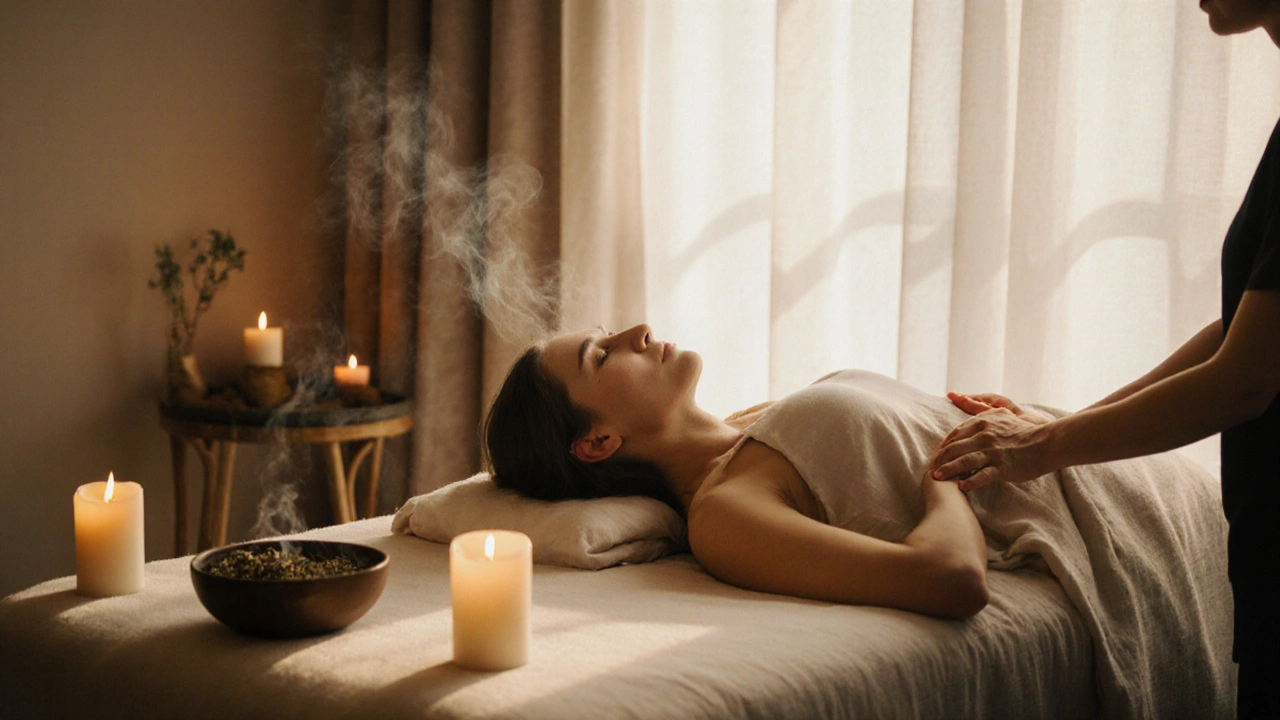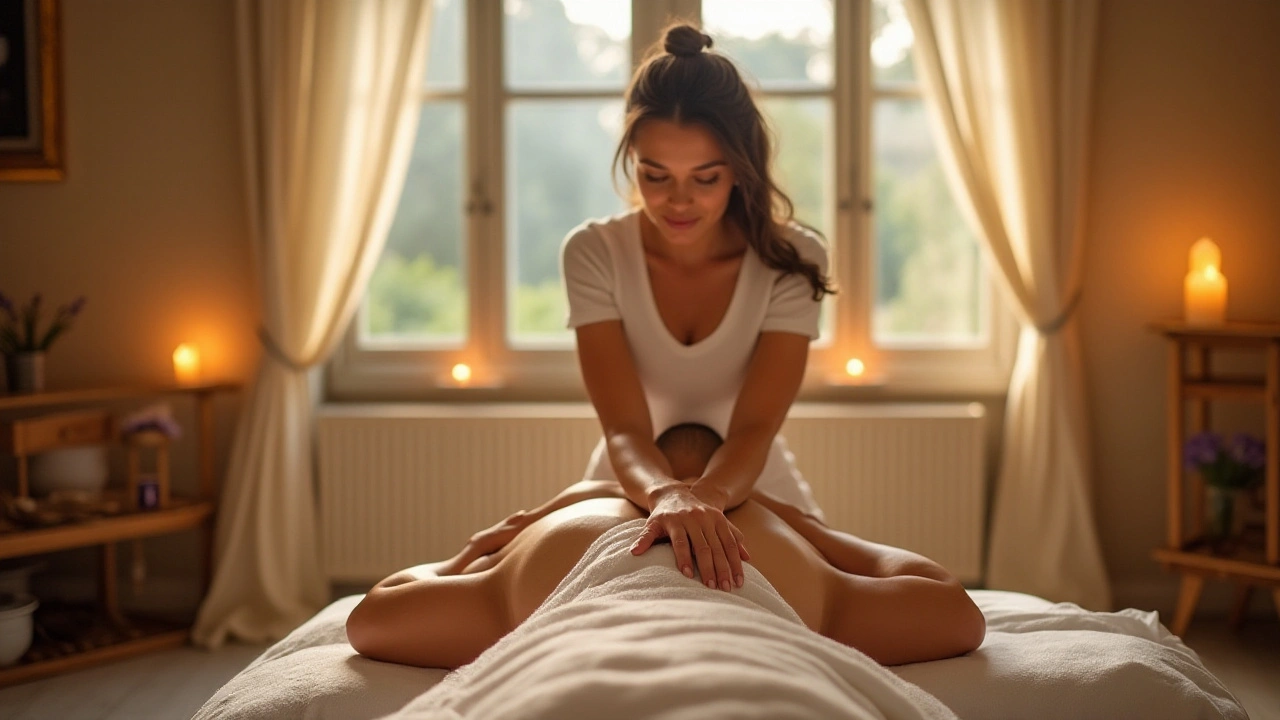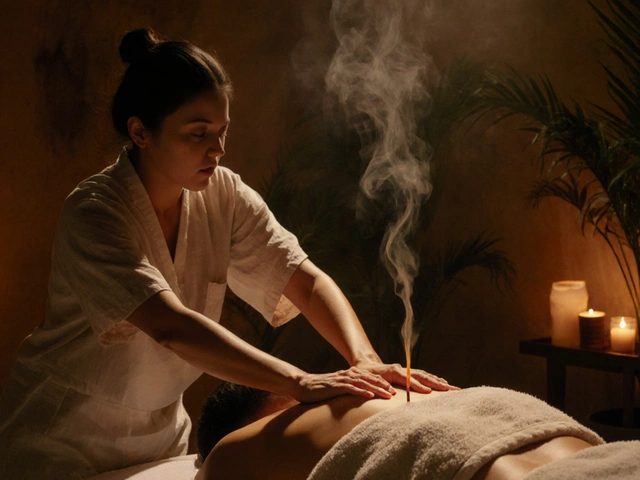You’ve probably heard whispers about yoni massage-maybe in a wellness blog, a friend’s quiet recommendation, or a podcast that made you pause and wonder. But what yoni massage really is, and why it’s more than just a physical touch, is something most people never get to understand. It’s not about sex. It’s not about performance. It’s about returning to yourself-deeply, gently, and without shame.
What Exactly Is Yoni Massage?
The word yoni comes from Sanskrit and means source or womb. In ancient traditions, it’s seen as the sacred entrance to a woman’s energy, creativity, and emotional core. A yoni massage isn’t a sexual act. It’s a mindful, intentional practice designed to release stored tension, trauma, and emotional blockages held in the pelvic region.
Think of it like a deep cleanse-not with chemicals, but with breath, touch, and presence. It’s not about arousal. It’s about awareness. Many women who try it for the first time say they feel something they haven’t felt in years: safety. Not just physical safety, but emotional safety. The kind that comes when no part of you is judged, rushed, or expected to perform.
Why So Many Women Are Turning to Yoni Massage
Women in their 30s and 40s-especially those who’ve had children, survived trauma, or lived with chronic stress-are the ones reporting the biggest shifts. One client in Birmingham told me she hadn’t felt any sensation in her pelvis since her C-section, eight years ago. After three sessions of yoni massage, she cried during her first orgasm-not because it was intense, but because it felt real.
Here’s what the research and lived experience show:
- Reduces pelvic floor tension and chronic pain
- Improves blood flow to reproductive organs
- Helps release stored emotional trauma
- Increases body awareness and self-acceptance
- Can ease symptoms of postpartum depression and anxiety
It’s not magic. It’s neuroscience. The pelvic floor is wired into the vagus nerve-the main highway for your parasympathetic nervous system. When that area is tight or numb, your whole body stays in low-grade fight-or-flight mode. Yoni massage gently reactivates that connection. You don’t just relax your pelvis-you relax your entire nervous system.
How It’s Different From Other Massage Types
Let’s be clear: yoni massage is not the same as sensual massage, tantric massage, or happy ending services. Those often focus on arousal or pleasure as an end goal. Yoni massage treats the yoni as a sacred space to heal-not to excite.
In a typical sensual massage, the goal might be to build toward orgasm. In a yoni massage, orgasm is a possible side effect, but never the target. The goal is presence. The goal is listening-to your breath, your body, your emotions. If tears come, that’s okay. If nothing happens, that’s okay too.
It’s also different from medical pelvic floor therapy. While physiotherapists use tools and exercises to fix muscle function, yoni massage works with energy, emotion, and memory. It doesn’t ask you to squeeze or hold-it asks you to let go.
What Happens During a Yoni Massage Session
Most sessions last 60 to 90 minutes. You’ll be in a quiet, warm room with soft lighting-maybe candles, incense, or calming music. You’ll lie on a massage table, covered with a sheet. The practitioner will begin with gentle full-body touch to help you relax. This isn’t optional. You need to feel safe before any intimate touch begins.
Then, with clean hands and organic, fragrance-free oil, the practitioner will slowly, gently, begin to touch the outer lips of the yoni. No rushing. No pressure. Just presence. You’ll be guided to breathe into any tightness or discomfort. You might be asked to notice sensations: warmth, tingling, numbness, even resistance.
If you feel triggered, you say so. The session stops. There’s no pressure to go further. You’re in control. Always.
Some practitioners use sound-humming, toning, or singing bowls-to help release tension. Others use breathwork. Some combine it with guided visualization. Every session is different. But the rules are the same: consent is ongoing. Boundaries are sacred. Your comfort comes first.

Where to Find Yoni Massage in the UK
Yoni massage isn’t widely advertised. You won’t find it on Google Maps or in spa brochures. It’s mostly offered by independent practitioners who specialize in somatic therapy, tantra, or women’s healing work.
In London, Birmingham, Manchester, and Brighton, there are a handful of trusted practitioners. Most operate through word-of-mouth or private websites. Look for professionals who:
- Have training in somatic therapy, trauma-informed care, or tantric practices
- Offer a pre-session consultation (this is non-negotiable)
- Use organic, unscented oils
- Have clear boundaries and consent protocols
- Don’t promise sexual outcomes
Some offer in-home sessions. Others work in private studios. Always ask about their background. A good practitioner will happily share their training history-certifications from schools like the International School of Temple Arts or Womb Awakening are good signs.
What to Expect in Terms of Cost
Prices vary depending on location and experience. In London, you might pay £120-£180 for a 90-minute session. In Birmingham or Manchester, it’s more like £80-£130. Some practitioners offer package deals-three sessions for £250 is common.
Why so expensive? Because this isn’t a quick massage. It’s a therapeutic process. Practitioners spend years learning how to hold space safely. They don’t offer this service to make money-they offer it because they’ve seen how it changes lives.
Don’t go for the cheapest option. This isn’t a service where you want to cut corners.
Safety First: What You Need to Know
Yoni massage is safe when done right. But it’s not risk-free. Here’s how to protect yourself:
- Never go with someone you don’t know or haven’t vetted
- Always have a pre-session call to talk about boundaries
- Ask about their hygiene practices-clean hands, clean sheets, no double-dipping oil
- Trust your gut. If something feels off, leave
- Don’t go if you’re pregnant, have an active infection, or are in acute emotional crisis-wait until you’re stable
Some women feel emotional after their first session. Tears, shaking, even anger. That’s normal. Your body is releasing what it’s been holding. Give yourself space afterward. Don’t rush back into work or social obligations. Take a warm bath. Drink water. Rest.

Yoni Massage vs. Lingam Massage: A Quick Comparison
| Aspect | Yoni Massage | Lingam Massage |
|---|---|---|
| Target Area | Female genitalia | Male genitalia |
| Primary Goal | Emotional release, trauma healing, body reconnection | Energy flow, sacred touch, deep relaxation |
| Focus on Orgasm | Not the goal | Not the goal |
| Typical Setting | Private studio or home | Private studio or home |
| Training Required | Advanced somatic or tantric certification | Advanced somatic or tantric certification |
| Common After-Effects | Emotional release, deep calm, increased body awareness | Deep relaxation, reduced stress, heightened sensitivity |
Frequently Asked Questions
Is yoni massage only for women who’ve had trauma?
No. While many women come after trauma, others come simply because they’ve lost touch with their bodies. Motherhood, stress, aging, or years of neglect can dull sensation. Yoni massage helps reconnect you to your physical self-no history of trauma needed.
Can I do yoni massage on myself?
Absolutely. Self-yoni massage is powerful and encouraged. Start with clean hands, warm oil, and five minutes of deep breathing. Gently touch the outer lips, then slowly move inward. Notice what comes up-fear, numbness, pleasure, nothing. Just observe. No judgment. This practice, done weekly, can transform your relationship with your body.
Will I orgasm during a yoni massage?
Maybe. But if you’re hoping for it, you’ll miss the point. Orgasms happen when the body releases tension-not when you’re trying to make them happen. Some women orgasm. Some cry. Some fall asleep. All are valid.
Is yoni massage legal in the UK?
Yes-when it’s offered by a trained practitioner focused on healing, not sex. The UK has no laws against therapeutic genital touch as long as it’s consensual, non-exploitative, and not for commercial sex. Practitioners who follow ethical guidelines operate legally and safely.
How many sessions do I need?
There’s no set number. Some feel a shift after one session. Others need three to five. Think of it like therapy-not a quick fix. The deeper the blockage, the more time it takes to unravel. Listen to your body. Go when you feel called, not because you think you should.
Ready to Begin?
If you’ve been feeling disconnected from your body-if you’ve ignored your pelvic area for years, or if you’ve been told your pleasure doesn’t matter-it’s time to try something different. Yoni massage isn’t about fixing what’s broken. It’s about remembering what was always there.
You don’t need to be spiritual. You don’t need to believe in energy. You just need to be willing to feel. To sit with discomfort. To let yourself be held-by another, or by your own hands.
Start small. Breathe. Touch gently. Listen.
Your yoni isn’t just a part of your body. It’s a doorway. And it’s waiting for you to walk through.









Aditya Sinha
November 20, 2025 AT 10:49yoni massage sounds like a fancy way to say "touch your private parts and call it therapy" lol. i mean seriously, if you need a stranger to touch your vagina to feel "safe", maybe you just need a good therapist and a hot bath.
Bethany Wappler
November 21, 2025 AT 12:47I find this deeply moving. The way you describe the yoni as a doorway-not a body part, but a sacred portal-is profoundly aligned with somatic healing principles. I’ve worked with trauma survivors for over a decade, and the pelvic floor holds grief like no other region. The fact that this practice honors consent, slowness, and non-performance is revolutionary in a world obsessed with outcomes. Thank you for normalizing this with such grace.
Vinayak Agrawal
November 23, 2025 AT 07:24This is exactly what women need right now. Too many of us have been taught to ignore our bodies until they scream. Yoni massage isn’t weird-it’s overdue. If you’ve ever felt disconnected after childbirth, trauma, or just life wearing you down, this is the reset button you didn’t know you needed. Do it. Your nervous system will thank you.
Sana Siddiqi
November 24, 2025 AT 20:19soooo… let me get this straight. you pay 180 quid for someone to touch your lady bits while whispering "breathe into it" and call it "neuroscience"? honey, i’ve had better emotional release after crying in a Target parking lot during a sale on oat milk latte. but hey, if you wanna spend your money on a 90-minute spa version of a therapy session that’s basically just being held by someone who took a weekend tantra course… go for it. i’ll be over here, healing with Netflix and a bag of chips.
Maria Biggs
November 25, 2025 AT 10:22Okay but let’s be real-this is just genital massage repackaged as spiritual healing. Where’s the evidence that this isn’t just a loophole for predatory men to touch women under the guise of "therapy"? And why is no one talking about how this targets vulnerable women who are already traumatized? It’s not healing-it’s exploitation with incense.
Ben Görner
November 26, 2025 AT 03:36Hey Maria, I hear your concern-it’s totally valid to be cautious about anything involving intimate touch. But the key here is training and consent protocols. The practitioners mentioned here are certified in somatic therapy and trauma-informed care. They don’t just "touch"-they hold space. And yes, there are bad actors in every field, but dismissing the entire practice because of potential misuse is like saying all therapy is dangerous because one therapist abused a client. The difference is in the structure, boundaries, and ethics. This post lays those out clearly.
Eddie Valdes
November 27, 2025 AT 11:58Neuroscience? Really? The vagus nerve connection is real, but you’re oversimplifying. Pelvic floor dysfunction is treated by PTs with biofeedback and manual therapy-not "oil and vibes." And orgasm as a "side effect"? That’s just PR spin. If you’re not aiming for it, why even mention it? This reads like a marketing brochure written by someone who watched three YouTube videos on tantra. Also, "sacred entrance"? That’s 1990s New Age fluff. Stop romanticizing anatomy.
Vikram Sinha
November 27, 2025 AT 20:57I’ve never tried it, but I’ve sat with women who have. What strikes me isn’t the technique-it’s the silence afterward. The way they look at their bodies differently. Not with shame, not with performance, but with quiet recognition. It’s not about healing trauma so much as remembering you were never broken to begin with. The body remembers what the mind forgets. This practice just gives it a voice.
Jenn Davenport
November 28, 2025 AT 10:09I did this after my divorce and I swear to god, I cried for three hours straight afterward. Not because it was painful-but because I finally felt like I was home in my own skin. I didn’t know I’d been holding my breath for 12 years. I’m not spiritual. I don’t believe in chakras. But I believe in the body. And this? This was the most honest thing I’ve ever done for myself. 🙏💖
Dan Mihai
November 29, 2025 AT 09:21While the phenomenological framework presented here is undeniably evocative, it lacks rigorous epistemological grounding. The conflation of somatic sensation with metaphysical sacralization constitutes a form of neotribalism-a postmodern reenchantment of the corporeal that risks commodifying vulnerability. Moreover, the absence of longitudinal neuroimaging data renders the purported vagal modulation claims speculative at best. One must interrogate the hegemony of wellness capitalism masquerading as liberation.